This master list of finger foods for toddlers, babies, and kids is your go-to list for healthy and delicious foods the kids can feed themselves…and easily and safely chew!
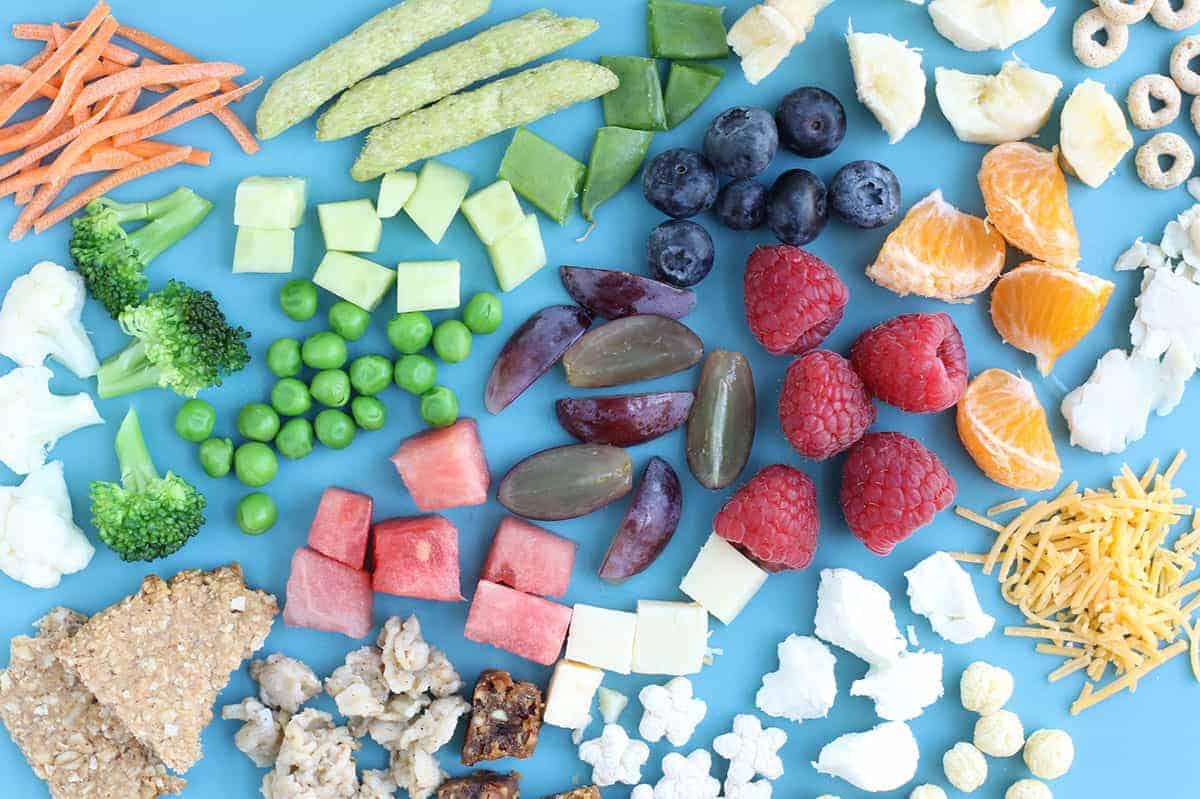
Finger Foods for Toddlers
When little ones want to feed themselves, which often happens soon after starting solids, it’s a perfect time to introduce healthy, fresh foods to make the most of their enthusiasm. Fruits, veggies, whole grains, meats, fish, beans, and more are easy finger foods for kids that are often super easy to prepare and easy for the kids to pick up and eat.
In this post you will find lists of recommended foods for toddlers, suggestions for how to cut and prepare them, and images of examples of what those foods may look like as your child grows.
I love to keep healthy finger foods in the mix even as kids get older since they make for simple, healthy snacks for kids that are usually low cost and low prep.
(You may also like finger foods for baby, baby snacks, healthy toddler snacks, toddler breakfast ideas, and toddler lunch ideas.)
Table of Contents
- Finger Foods for Toddlers
- How to Serve Finger Foods to Kids, Step-by-Step
- First Finger Foods for Babies
- Finger Foods for Toddlers and Babies: Fruit
- Finger Foods for Toddlers and Babies: Vegetables
- Finger Foods for Kids: Dairy
- Finger Foods for Toddlers and Babies: Meat/Poultry/Fish
- Finger Food Ideas: Legumes/Nuts
- Finger Foods for Kids: Whole Grains
- Easy Finger Food Ideas: Snacks
- Frequently Asked Questions
- Finger Foods for Kids at Daycare
- Best Tips for Success
How to Serve Finger Foods to Kids, Step-by-Step
- Wash, dry, and prepare food so it’s easy to chew. This often means cutting the food into bite-size pieces or thin slices, especially for younger toddlers.
- A good rule to help prevent toddler choking or excessive gagging is to avoid anything hard (like a raw carrot), round (like a slice of hot dog or a whole grape), sticky (like a spoonful of nut butter), or very chewy (like gummy candy).
- Offer a dip or sauce with raw produce to add flavor and nutrients.
- Model eating a new food to help the kids understand how to eat and bite it, as needed.

First Finger Foods for Babies
Foods that squish easily between your fingers are a safe bet for babies and younger toddlers. Think cooked peas, raspberries, chunks of banana, diced avocado, and soft cheese. Aim to cut food into small pieces—roughly the size of a pea or two—as they start eating finger foods to give them plenty of chances to practice eating and chewing.
Always adjust sizes of foods to suit the age and eating experience of your own child and add more complicated textures as they grow.
If you are just starting out with baby-led weaning foods or if baby is younger than 9 months, longer sticks of food are usually easier to pick up and self feed. Once a baby has mastered her pincer grasp around the age of 9 month and can pick up a food like a puff or a Cheerio with their fingers, you can move on to soft diced foods.
TIP: Check out my best first finger foods for babies for more ideas.
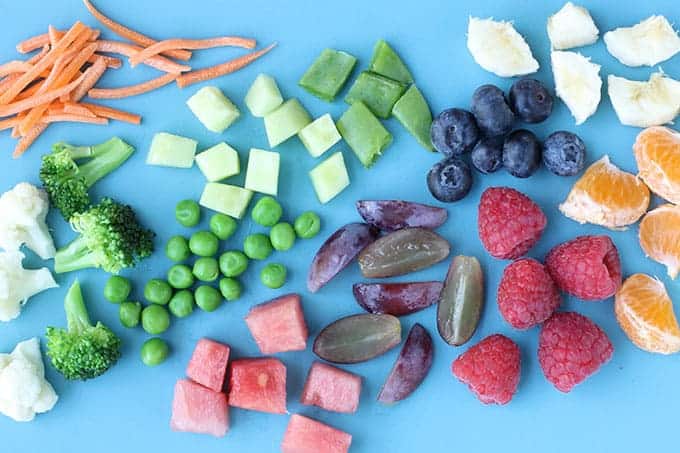
Finger Foods for Toddlers and Babies: Fruit
Fruit is a wonderful finger food for kids since it’s often very flavorful and usually needs little to no prep. Below are some of my favorite fruits for kids, along with serving suggestions
- Apples, shredded or cut into matchsticks, or steamed or sliced baked apples that are roasted until soft. (See apples for babies.)
- Bananas, broken up and sectioned (these are easier to pick up than slices, which can be slippery)
- Blackberries, halved if large
- Blueberries, halved if large
- Cantaloupe, diced (make sure it’s very ripe and soft). (See cantaloupe for baby.)
- Cherries, pitted and chopped. (See cherries for baby.)
- Clementines or oranges, halved or diced. (See oranges for baby.)
- Grapes, sliced in half or quarters vertically. (See grapes for kids.)
- Honeydew, diced (make sure it’s very ripe and soft)
- Kiwi, diced
- Mango, diced (make sure it’s very ripe and soft)
- Pears, diced with or without the skin or cut into matchsticks (make sure they’re very ripe and soft)
- Raspberries, halved if large
- Strawberries, diced
- Watermelon, diced or in sticks (See watermelon for baby.)
TIP: See my Master List of Fruit for Kids.
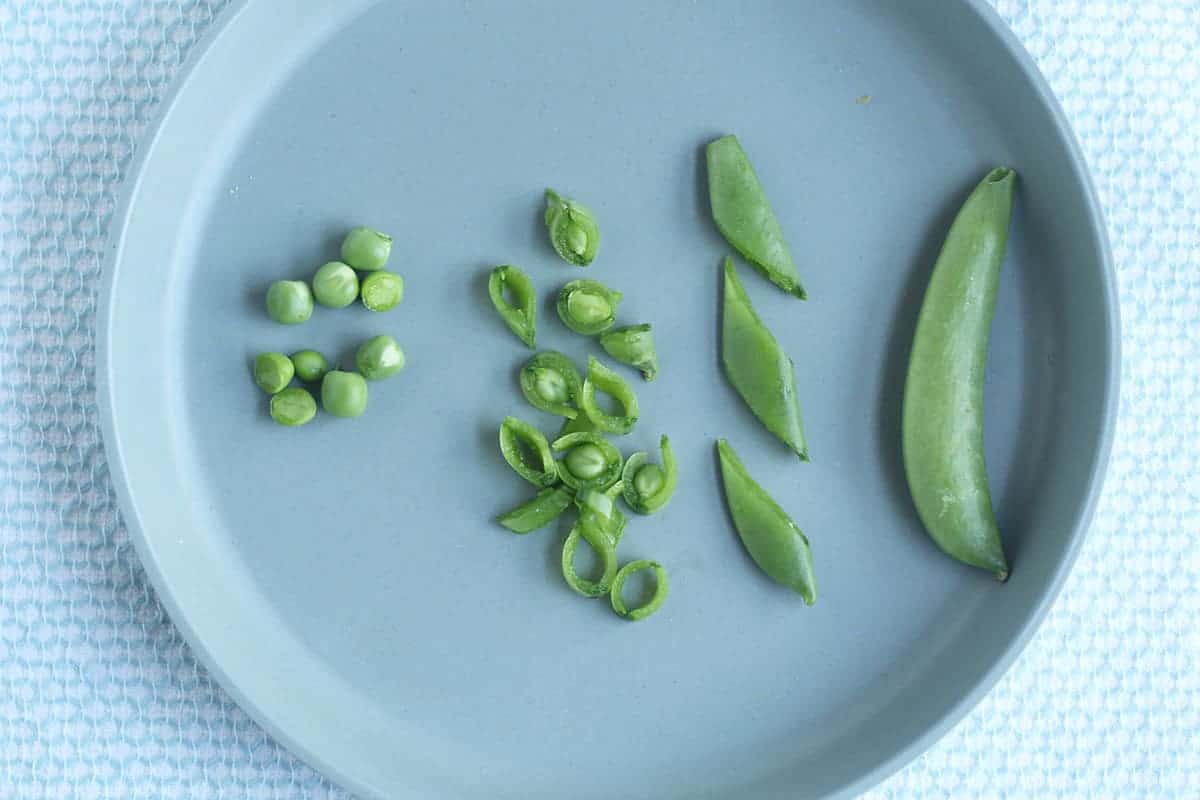
Finger Foods for Toddlers and Babies: Vegetables
Most raw veggies will be too hard for little ones to chew, so read the suggestions below for easy ways to cook them—and for advice on which work well served raw.
- Avocado, cubed or sliced
- Broccoli florets, steamed or roasted. (Try Roasted Frozen Broccoli.)
- Butternut squash, steamed or roasted until soft. (Try Mashed Butternut Squash.)
- Carrots, shredded and served raw to toddlers over 18 months, or diced and steamed or roasted until soft. (Try Sauteed Carrots and Carrot Fries.)
- Cauliflower florets, steamed or roasted. (Try Steamed Cauliflower.)
- Cherry tomatoes, halved or quartered
- Cucumbers, sliced or diced (you may want to wait until at least 18 months and then remove the skin)
- Snap peas for kids, diced fresh for kids over 2 or steamed for younger eaters
- Sweet potato, peeled, diced and roasted until soft, or roasted whole until soft and served in pieces
- Thawed frozen corn
- Thawed edamame, cut in half as needed
- Thawed frozen peas
- Zucchini or yellow squash, diced or sliced and sauteed, steamed, or roasted. (Try my best zucchini recipes.)
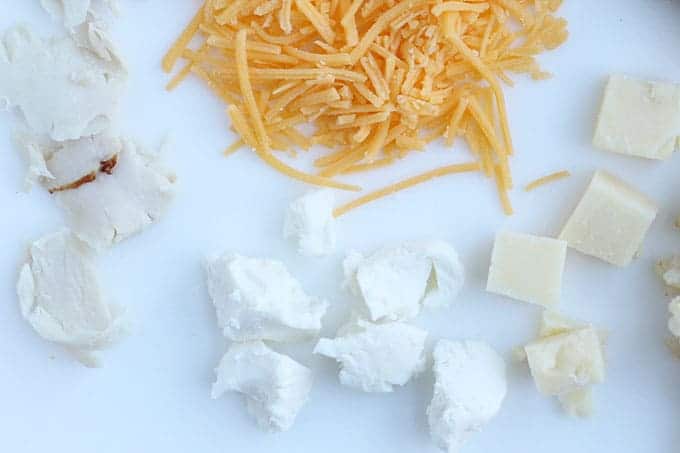
Finger Foods for Kids: Dairy
Dairy is an often overlooked finger food for kids, but there are so many easy ways to serve it!
- Cheese, diced or shredded. (Learn more about cheese for toddlers.)
- Cottage cheese, 4% offered on preloaded spoons or on a highchair tray (yes, it’s messy!)
- Egg muffins, diced
- Frozen yogurt melts
- Goat cheese, crumbled
- Hard cooked eggs, diced (yolks may be easier to chew, but some kids like only the whites)
- Scrambled eggs
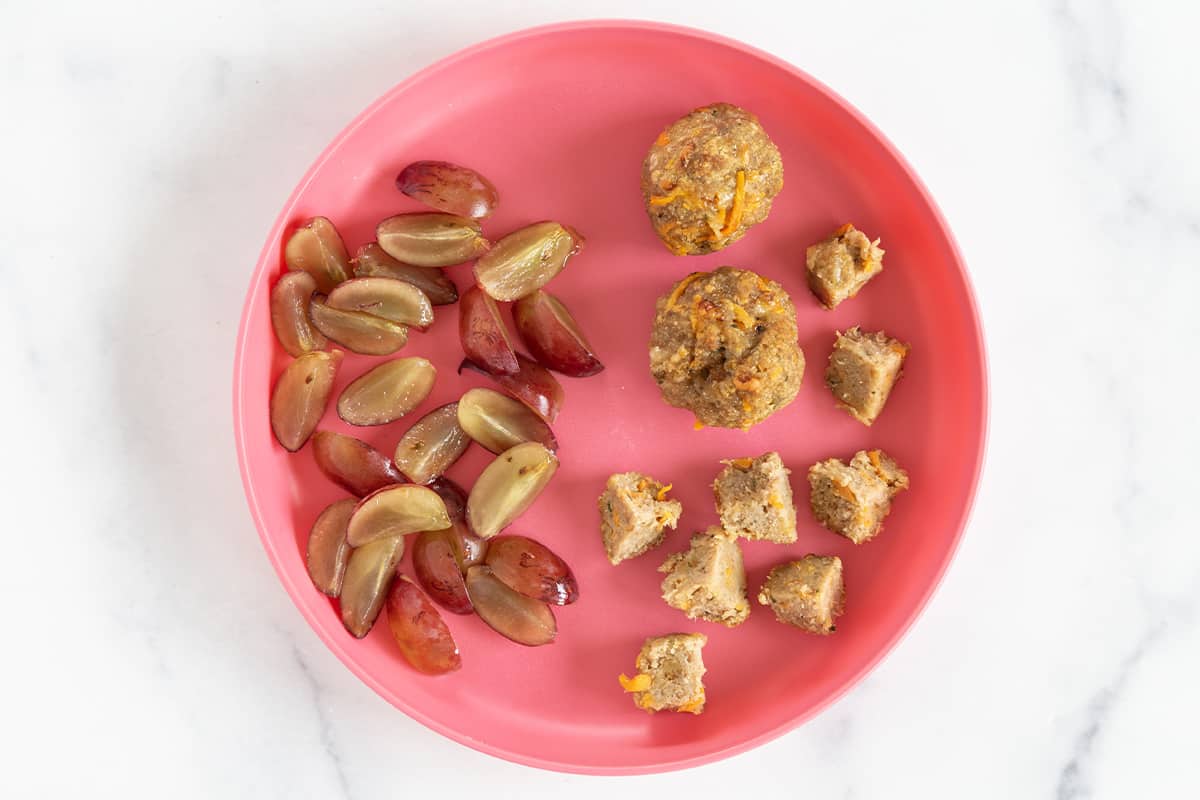
Finger Foods for Toddlers and Babies: Meat/Poultry/Fish
It’s easy to serve meat, poultry, and fish to little kids as long as it’s soft and easy to chew. Here are some ideas.
- Beef, ground and cooked through and either diced (if in something like a healthy meatball) or served mashed.
- Beef, shredded (anything cooked in a slow cooker or Instant Pot and shredded is likely to be an easy texture to chew)
- Chicken, diced (just be sure it’s not too dry)
- Chicken, ground and cooked through and either diced (if in something like a baked chicken meatball) or served mashed
- Chicken, shredded (anything cooked in a slow cooker or instant pot, like my Butter Chicken, and shredded is likely to be an easy texture to chew)
- Deli meat (sliced turkey, ham, or salami, cut up into small pieces)
- Fish sticks
- Meatballs, diced or slightly mashed
- Salmon, poached or baked and diced or shredded
- Shrimp, cooked until very soft and diced
- Tilapia, cooked and shredded
- Turkey, roasted breast or thigh meat and diced or shredded; or ground and cooked through; or Turkey Baby Meatballs
- White fish, cooked through and diced or shredded
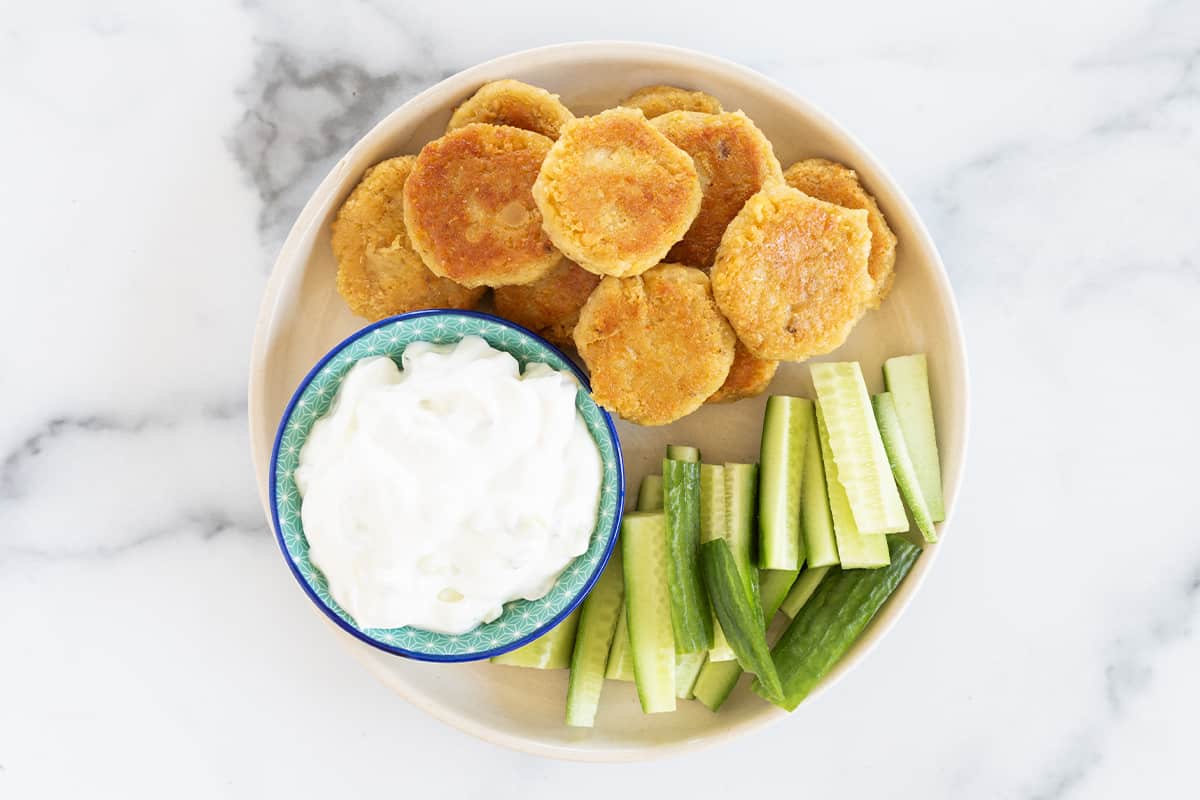
Finger Food Ideas: Legumes/Nuts
You may want to mash beans slightly to make sure they are soft for the kids.
- Chickpeas (like Soft-Baked Cinnamon Chickpeas) or in these Chickpea Fritters
- Edamame, steamed or boiled according to package directions
- Energy bites, diced
- Hummus (with a cracker for dipping)
- Larabars minis, diced (for over 12-18 months)
- Finely chopped cashews and walnuts (2 or 3 and up)
- Nut butter (on toast cubes or sticks)
- Thawed frozen peas
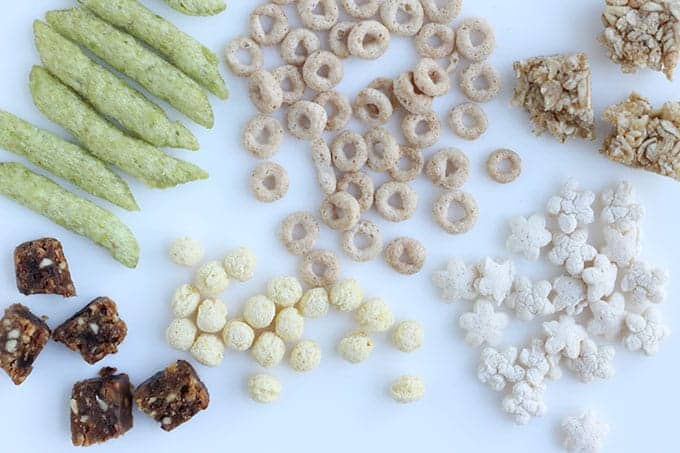
Finger Foods for Kids: Whole Grains
Whole grains, whether cooked from scratch or served in a food like bread or a muffin, are a nutritious category of finger food ideas.
- Applesauce Pancakes, diced
- Baked French toast, diced
- Baked Oatmeal Cups
- Cheesy Rice, fully cooked until soft with mashed avocado or shredded cheese to help it hold together as needed
- Crackers, whole grain (Breton and the whole grain mini rounds in the brown box from Trader Joes are nice and soft)
- Oatmeal, cooked until it’s nice and thick so it’s easy to pick up with fingers (you can also add 1 teaspoon chia seeds, let sit for 5 minutes, and it will thicken up)
- Quinoa, fully cooked until soft with mashed avocado or shredded cheese to help it hold together as needed
- Soft snack bars, homemade granola bars, or Dino Bars
- Spinach Muffins, diced
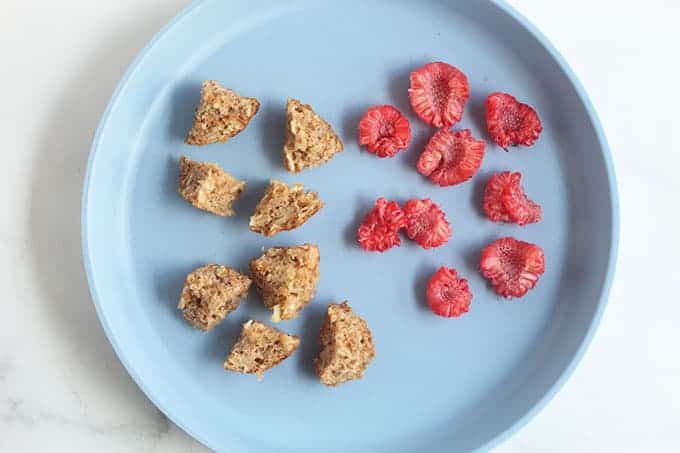
Easy Finger Food Ideas: Snacks
Having a few go-to store-bought snack food options is super handy. These are some of my favorites.
- Animal Crackers
- Baby Puffs (like Plum Organics or Happy Baby)
- Cereal for kids (low sugar): Cheerios, Kix, Chex
- Cheese crackers
- Mini rice cakes
- Nature’s Bakery Fig Bars, and Dino Bars
- Quinoa Chips (these are softer than regular chips, and high in protein; best for over 2 or 3)
- Snap pea crisps
- Veggie Straws
- Whole grain crackers
- Whole grain graham crackers
Frequently Asked Questions
Absolutely! Gums are incredibly strong, as is the tongue, so how many teeth your baby or toddler has (or doesn’t have!) is not an indication of how well they will be able to eat finger foods. The key is to make sure that the foods are soft enough for them to chew and the pieces are an appropriate size.
Cut the foods into bite-size pieces or thin strips, make sure the food is easy to chew, model biting the foods if the food is new, make sure the food tastes good, and focus on other things during meals to avoid putting too much pressure on the child.
Yes, that is quite common and can be quite unpredictable. Here’s more information on what to do when a toddler is not eating.
Finger Foods for Kids at Daycare
The foods in this post can be really helpful when packing food for daycare to make meals easy for your baby or toddler to eat. Aim for a mix of nutrients with whole grains, protein, fat, and lots of produce to help them meet their nutrient needs.
The lists in this post are designed for kids over 9 months. For younger babies doing baby-led weaning, serve foods in longer/larger pieces as needed, and avoid anything that’s not soft enough for them to easily chew. (The foods should still squish between your fingers easily or dissolve quickly like a puff.)
Sit with your kids whenever they eat and especially whenever they try new foods to see how they handle it—and so you can see if you need to cut things bigger or smaller to meet them where they are.
Best Tips for Success
- Review the common toddler choking hazards to ensure meals and snacks are safe.
- Cut foods into bite-size pieces or model how to take bites if the kids are still learning.
- Remember that any food can be a finger food!
- Aim to include a variety of food groups in finger foods for toddlers throughout the week.
Related Posts
I’d love to hear your feedback on this post, so please comment below!
This post was first published May 2017.
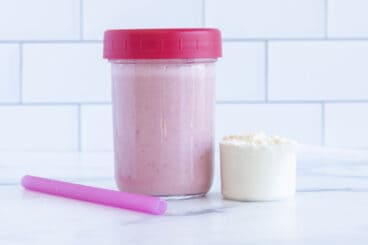
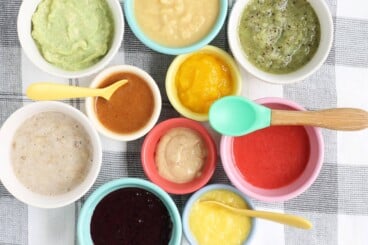
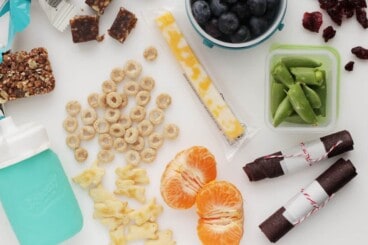
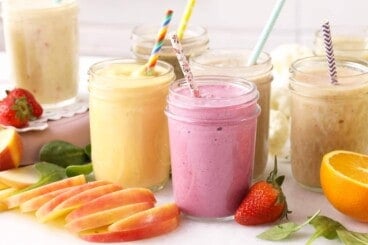
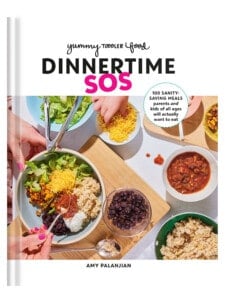
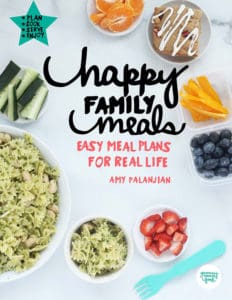

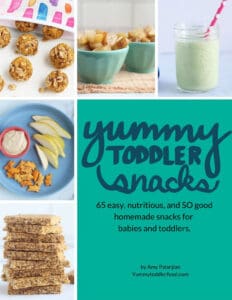














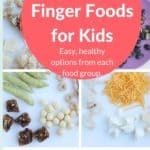
I look at this list before every grocery trip. Thank you!
I’m so glad it’s helpful!
This is AWESOME! I’m a first-time mom with a 14 month old baby who is allergic to dairy AND soy (OMG) so finding a variety of healthy food options that she won’t choke on is really hard!!! I appreciate you taking the time to create this and share it!
I’m so glad that it’s helpful!
This is so helpful! Thank you from Saratoga Springs!
You’re so welcome!
This was so helpful. Thank you, Amy.
I’m so glad to hear that!
I came across the idea of finger food for babies, while reading ‘how to introduce solid foods to your baby’ by Susan Urban from parental-love.com and I thought that it is a brilliant thing! Since then I’m exploring internet for more ideas what to give to my son in this form. Thanks for this article!
Such a helpful list!
This is so relevant for my family right now! As we follow a primarily Baby Led Weaning approach with our son, we’re constantly looking for new foods give him as snacks in between meals, or as part of a meal if there is something he might not be able to handle at this point. I love how it is broken down into the food groups as well. Sometimes I find myself with many options for one food group (dairy) and not so many options in others (meat). I will definitely be referring to this frequently in the coming months (and perhaps years)!
So helpful! It’s amazing what I forget from the first time around!
What a nice comprehensive and thoughtful listing. It’s bookmarked! I will enjoy sharing this as well! Thank you!
Hi there, my 9.5 month old baby gags a lot on soft finger food and her pincer grasp hasn’t developed yet. So I’m either giving her really small pieces of food on a preloaded spoon or she gets finger foods but I’m very concerned about the excessive gagging. It gets to the point where her face turns red and it looks like she’s struggling to breath until she manages to cough the food out. For example, I gave her a crusty piece of bread to gnaw on to practice chewing and she bit off a piece that she couldn’t chew properly or was simply too big. Is it realistic for babies to chew properly at this age? Because of the gagging I just want to stick to very tiny pieces (basically mashed with a fork). What’s your take on excessive gagging?
Hi- it may be unrealistic to expect a 9 month old to be able to proper chew something as chewy and hard as a piece of bread, especially since as you say they can bite off pieces. I would try to make sure that the food you’re offering her is soft and easy to squish between your fingers to make this easier for her, and if that food is slippery, you can add things like a little sprinkle of breadcrumbs or hemp seeds to help slow it down in her mouth. You can offer pea size pieces of food that aren’t mashed if they are soft—scrambled egg, pancakes, all sorts of fruits and cooked veggies, meatballs, etc. This post specifically goes through a lot of options: https://www.yummytoddlerfood.com/finger-foods-for-baby/
I’m going to print this list out for our nanny! (And for us.) It’s so tricky figuring out the right way to approach finger foods and this list is going to be such a huge help as our now-7-month-old progresses past purees.
As a grandmother to a toddler , this list is extremely useful!
Good list
This is such a great list. I was so lost when this time came for me as a first time mom. Having a guide like this is helpful for new moms who may not be so sure about what foods to introduce their babies.
So many great tips, thanks for all of the ideas!
After you start your baby on solids, the search for different types of safe, tasty food begins. We have some easy bite-size snack suggestions that your child will love.
https://www.parentcircle.com/article/5-healthy-finger-foods-for-your-toddler/
This is a great site . Loved the ideas